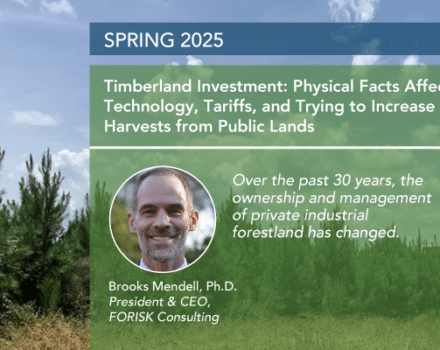
Timberland Investments: Physical Facts Affect Technology, Tariffs, and Trying to Increase Harvests from Public Forests
The author of this article, Dr. Brooks Mendell, is President and CEO of Forisk Consulting. He has three decades of consulting, operating, and research experience in the forest products and timber industries. For more than 20 years, he has provided research, management consulting, and educational services to timberland investors, timber REITs, wood-using manufacturing and bioenergy … Continue Reading →
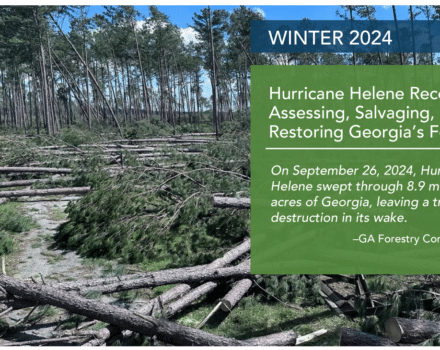
Hurricane Helene Recovery: Assessing, Salvaging, and Restoring Georgia’s Forests
The Georgia Forestry Commission estimates timber losses at a staggering $1.28 billion from Hurricane Helene. For a detailed analysis of the storm’s impact on Georgia’s forests, refer to the Timber Impact Assessment. Storms like Helene inflict varying degrees of damage across forested landscapes. Factors such as tree species, age, height, stand density, and the timing … Continue Reading →
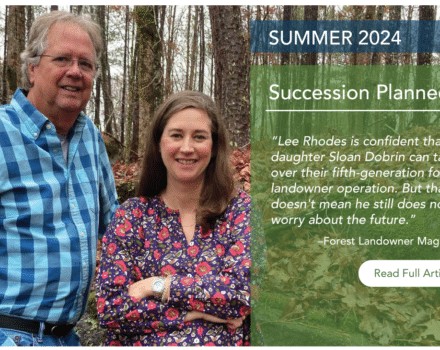
SUCCESSION PLANNED
The Rhodes family has a rich history in forestry, dating back over 100 years. Sloan Dobrin, a married mother of three, is stepping into the role of managing her family’s five-generation forest operation, Rhodes Timber. At 37, she’s gradually taking over from her father, Lee Rhodes, who has managed the multi-generational family business since … Continue Reading →
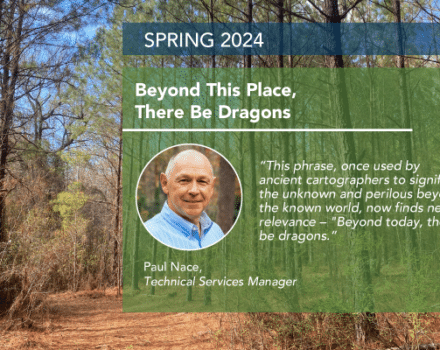
“Beyond This Place, There Be Dragons”
“Beyond this place, there be dragons.” This phrase, once used by ancient cartographers to signify the unknown and perilous beyond the known world, now finds new relevance – “Beyond today, there be dragons.” The modern cartographers at FRC are confronting these dragons, born from the internet and the rapid evolution of technology. With a blank … Continue Reading →
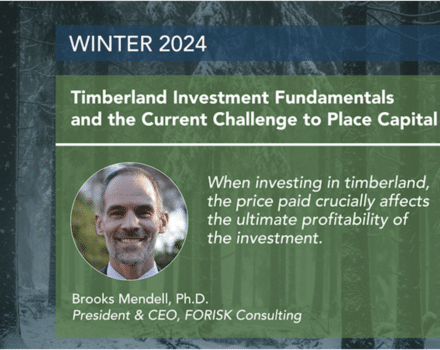
Timberland Investment Fundamentals and the Current Challenge to Place Capital
Timberland Investment Fundamentals The author of this article, Dr. Brooks Mendell, is President and CEO of Forisk Consulting. He has three decades of consulting, operating, and research experience in the forest products and timber industries. For more than 20 years, he has provided research, management consulting, and educational services to timberland investors, timber REITs, wood-using … Continue Reading →

How Do I Evaluate or Appeal My Property Tax Assessments?
Property tax assessments and taxes have increased significantly since 2000, and in many cases have added a disproportionate financial burden to rural landowners.
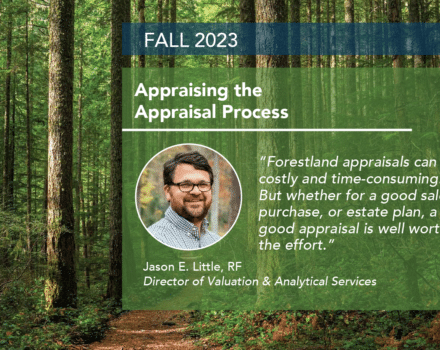
Appraising the Appraisal Process
Appraisal Process Management of the appraisal process can be a daunting task for you, your family, and your business. The key to successful management is engaging a competent certified appraiser experienced in forestland valuation. Appraisals can be invaluable tools in the planning process for estates, families, generational transfers, and businesses. With more than 40 years … Continue Reading →
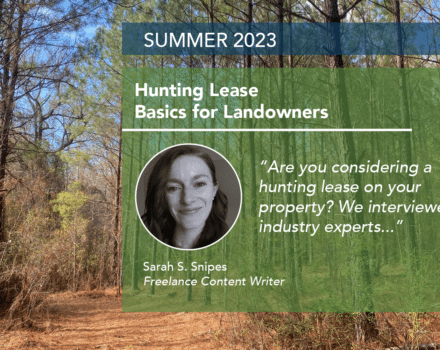
Hunting Lease Basics for Landowners
Hunting Lease Basics for Landowners Are you considering a hunting lease on your property? We have interviewed industry experts to gain an understanding of hunting lease basics and the landowner-hunter relationship. Lee Laechelt of the Alabama Forest Owners’ Association (AFOA) says demand for hunting land has risen in recent years, creating more opportunities for landowners … Continue Reading →
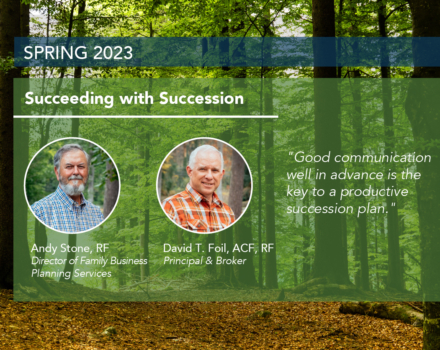
Succeeding with Succession
Succeeding with Succession Family businesses in transition have only a 30 percent probability of successful transfer to the second generation. With better planning and communication, you can boost those odds. This article was originally published in the March-April 2023 Forest Landowners magazine. Andy and David will be conducting a seminar on the topic of Family … Continue Reading →
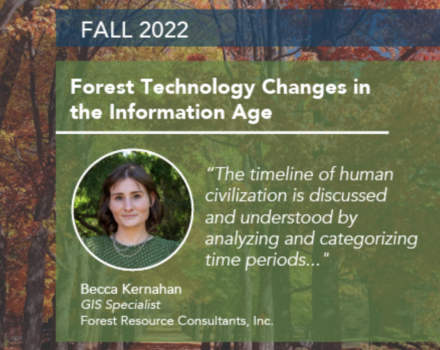
Forest Technology Changes in the Information Age
Forest Technology Changes in the Information Age The timeline of human civilization is discussed and understood by analyzing and categorizing time periods defined by major moments in history. Every historical period has integrally changed the way society has perceived, interacted with, and understood the world. Since the mid-1700s, these periods have been characterized by technological innovation. These innovations have … Continue Reading →
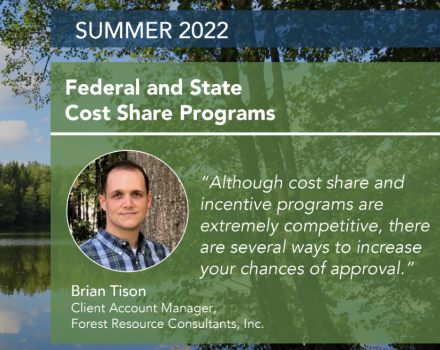
Federal and State Cost Share Programs
Did you know the USDA Natural Resources Conservation Service (NRCS), USDA Farm Services Agency (FSA), and U.S. Fish and Wildlife Service (USFWS) offer several cost share and incentive programs to help landowners meet their forestry management goals? How do Federal and State Cost Share Programs work? Stemming from the United States’ long historical support of … Continue Reading →
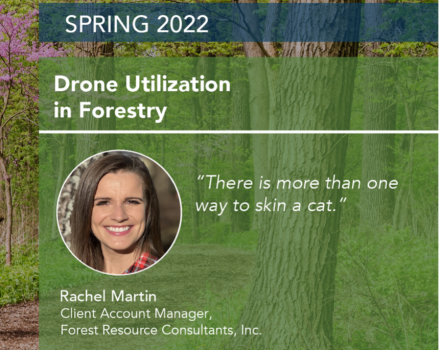
Drone Utilization in Forestry
Drone Utilization in Forestry “There is more than one way to skin a cat.” This expression can easily be applied when discussing today’s forest operations. Advancements in technology and connectivity have led to the expansion of the forest management toolbox. One rapidly evolving addition in forestry technology is the use of drones for many woods-related … Continue Reading →
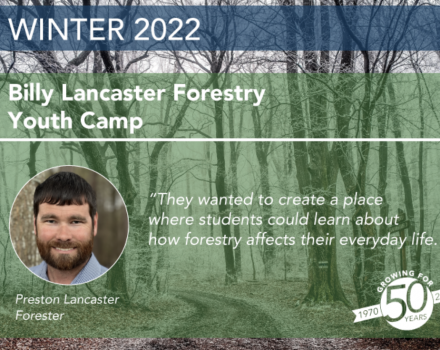
Billy Lancaster Forestry Youth Camp
Billy Lancaster Forestry Youth Camp Back in 1988, my father, Billy Lancaster, decided to start a forestry camp for young kids. He went to one when he was a kid and wanted today’s youth to have the same opportunity he had at their age. With the help of some of his good friends who were … Continue Reading →
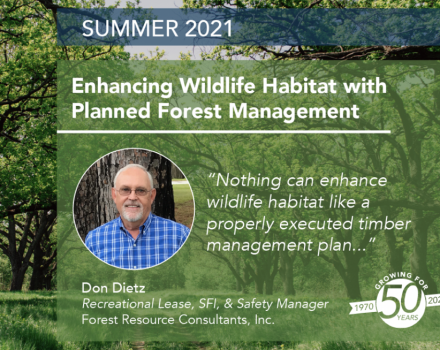
Enhancing Wildlife Habitat with Planned Forest Management
Enhancing Wildlife Habitat with Planned Forest Management As a young biologist working for a large timber company, I quickly learned a forester does not need a wildlife biologist to help manage a forest. However, a wildlife biologist does need a forester to accomplish wildlife objectives. Yes, a wildlife biologist can recommend doe harvests and the … Continue Reading →
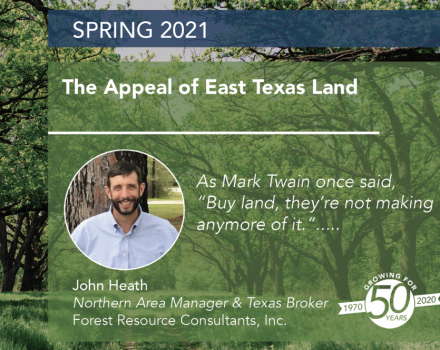
The Appeal of East Texas Land
The Appeal of East Texas Land As Mark Twain once said “buy land, they’re not making it anymore.” Historically, rural land investments are one of the most stable investments an individual can make. It usually maintains or even increases in value over time. Land investment also provide diversity in a portfolio of assets. In Texas, … Continue Reading →
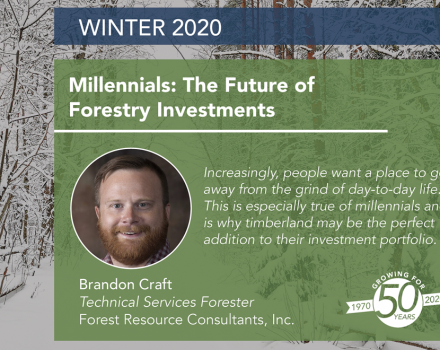
Millennials: The Future of Forestry Investments
If you subscribe to this newsletter, you probably already know forestry is a compelling investment. Whether directly owning timberland or owning stock in a timber REIT, forestry investments provide an attractive alternative to traditional investment vehicles. Timberland returns are derived from a combination of biological timber growth and revenue generated from timber harvests and real … Continue Reading →
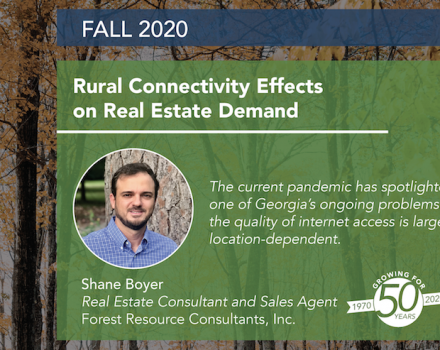
Rural Connectivity Effects on Real Estate Demand
Rural Connectivity Effects on Real Estate Demand Fall is in the air! With this year rapidly winding down, I know most are looking forward to a fresh start in 2021. COVID-19 has affected all of us both personally and professionally at some level. Some industries and markets have been devastated while others have experienced expansion … Continue Reading →
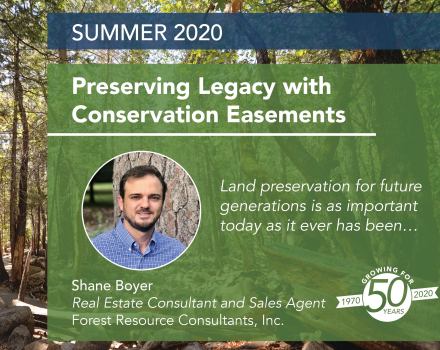
Preserving Legacy with Conservation Easements
Preserving Legacy Conservation Easements Land preservation for future generations is as important today as it ever has been. Private landowners understand how nature attributes to their family’s quality of life. For this reason, the legacy of their land holdings is often of supreme importance. This creates some difficult decisions when more intensive land use opportunities … Continue Reading →
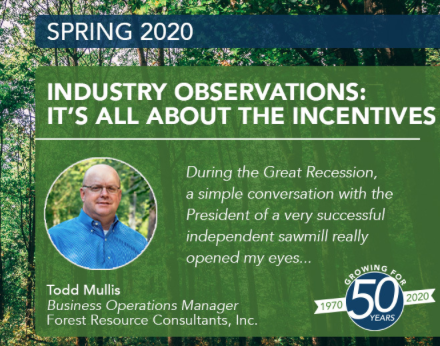
Industry Observations: It’s All About the Incentives
Industry Observations: It’s All About the Incentives In the first two articles of this series, we introduced the basic business fundamentals of supply and demand and working markets during the COVID-19 crisis. In our final article, we will explore how incentives are driving management behaviors in the COVID-19 economic environment. I’ll also provide insight into … Continue Reading →
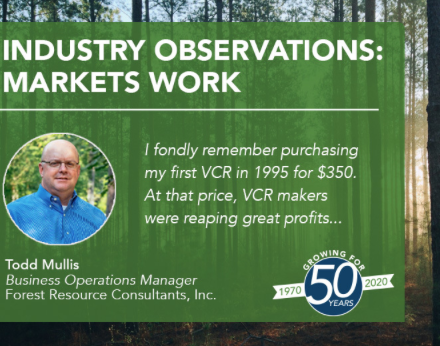
Industry Observations: Markets Work
Industry Observations: Markets Work In the first article of this series, we introduced how changing business conditions resulting from COVID-19 were impacting the basic fundamentals of supply and demand. As we continue to deal with economic uncertainty in the current business climate, our second article presents an overview of general market principles that help us … Continue Reading →
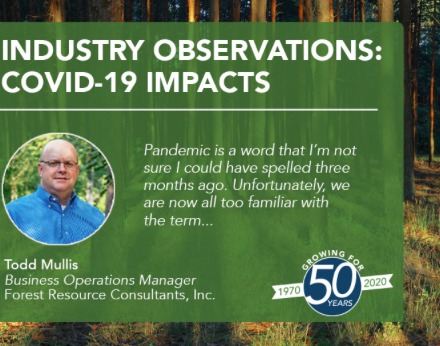
Industry Observations: COVID-19 Impacts
Industry Observations: COVID-19 Impacts Pandemic is a word that I’m not sure I could have spelled three months ago. Unfortunately, we are now all too familiar with the term and with COVID-19. I don’t think any of us saw this one coming, and they sure didn’t teach us about this in forestry school. As we … Continue Reading →
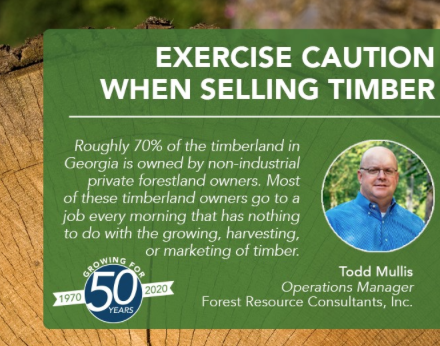
Exercise Caution When Selling Timber
Exercise Caution When Selling Timber Roughly 70% of the timberland in Georgia is owned by non-industrial private forestland owners. Most of these timberland owners go to a job every morning that has nothing to do with the growing, harvesting, or marketing of timber. Given timber is such a unique asset class and selling it occurs … Continue Reading →
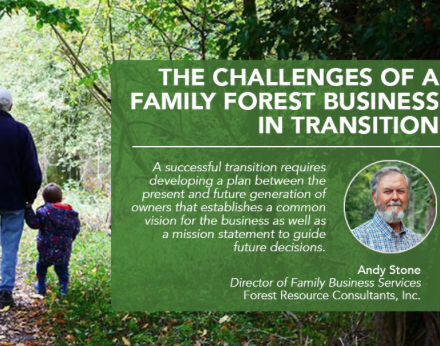
The Challenges of Managing a Family Forest Business in Transition
The Challenges of Managing Family Forest Business in Transition Historically, most entrepreneurs have acquired their initial timberland property for recreational purposes or from an inheritance. Over time, additional property is acquired, and their ownership slowly grows into a significant part of their overall investment portfolio. As time passes, the ownership develops into a sizable family … Continue Reading →

How Do I Responsibly Manage My Lands?
Every timberland owner has the desire to manage their property responsibly, but there are varying degrees of knowledge about how to best accomplish that objective. Some owners seek the advice of family members, friends, service contractors, or timber buyers. Others may use government assistance or seek professional guidance.

How Much is My Land Really Worth?
What something is “worth” can mean various things to different people. In most cases, “worth” implies “market value”, which means the price that a preponderance of knowledgeable buyers would pay for your property.
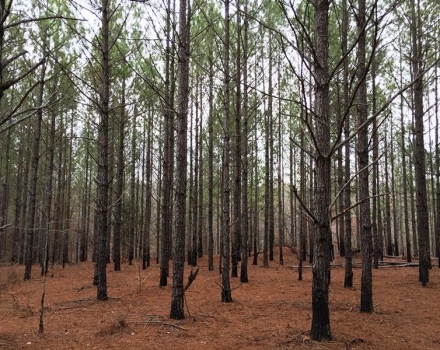
What Is My Timber Worth?
Every landowner asks, “What is my timber worth?” The most truthful answer is, “It all depends!”

What Are the Options for Selling My Land?
You have made the decision to sell your property but you are not sure how to start. You obviously want to get the best price you can, but how do you go about it?

Changes of Biblical Proportion: 50 Years of Forestry in the South
Changes of Biblical Proportion Remember the good old days, when “Timber was King”? There was a broad, diverse, healthy and competitive market for timber products. For decades, timber prices were strong and rising. Clients were confident, even enthusiastic, about spending money on reforestation in anticipation of solid, competitive financial returns and revenue. Every raindrop grew … Continue Reading →
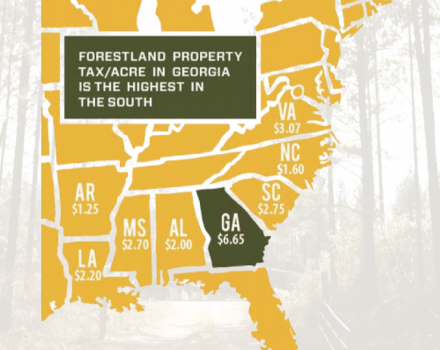
Georgia Amendment 3 – Why You Should Vote YES
Georgia Amendment 3 Currently, forestland property taxes in Georgia average approximately three times higher than any other state in the Southeastern U.S. Amendment 3 will address this issue by: 1) provide uniformity in the valuation of timberland across the state’s 159 counties, 2) increase the conservation of forestland on properties “at-risk” of conversion to other … Continue Reading →

How Do I Sell My Timber?
A timber harvest is the single most important event during the rotation of a forest stand, and a successful, well-planned timber sale will maximize income to the owner while minimizing adverse impact on other uses of the land.

How Do I Lease My Property for Hunting and Recreation?
Recreational leases are a good way to generate some annual income from your property, but there are advantages and problems associated with hunting leases.
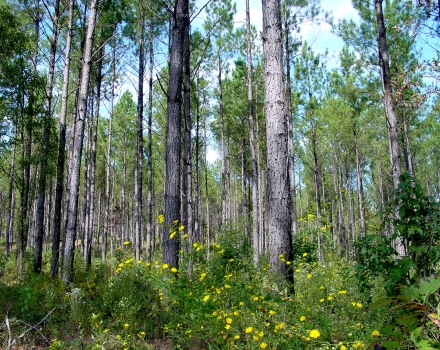
How Do I Value an Estate and Gift or Divide Timber Property?
For some, timberland may be a large portion of their portfolio or estate value such that it becomes a critical asset that needs to be dealt with expertly.
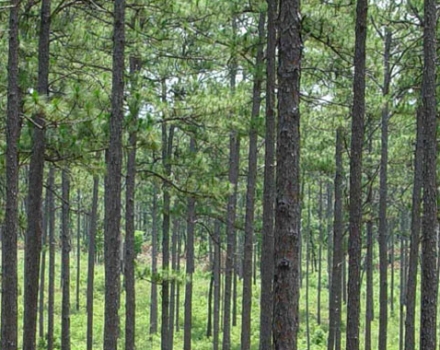
How Do I Find, Evaluate and Purchase Timberland?
The Internet and real estate websites have made it much easier for buyers to find available properties. This technology has also made it easier for buyers (and sellers) to make mistakes during the evaluation and transaction process.
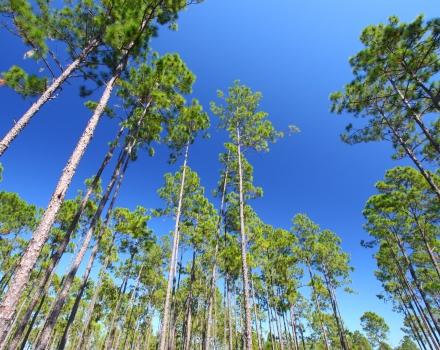
Are My Forests Healthy?
Landowners who desire to be good stewards of their property realize that a healthy forest is no accident – it does not just happen; it takes effort, involvement, and knowledge to make the best management decisions.
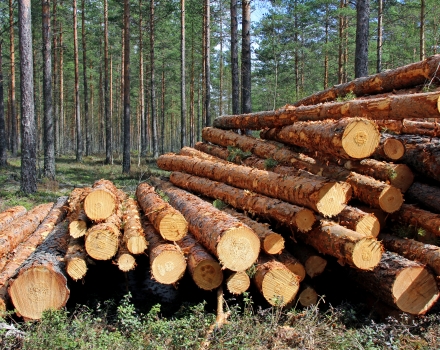
Improve Timberland Returns by Reducing Your Property Taxes
One of the largest expenditures for many timberland owners in Georgia is their annual property tax payment. Property taxes can have a negative impact on timberland’s investment value (net present value) and financial returns over the long term. However, many landowners do have options to reduce their property tax obligations and improve long-term returns from growing timber.
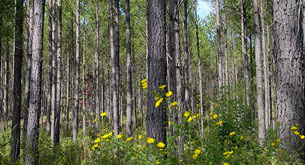
Ad Valorem Taxes – Appeal Rules
As an owner of real property in Georgia, you have always had the right to appeal a property’s assessed value. Senate Bill 346, which passed in 2010, changed some of the rules and regulations regarding appeals. In this article, we have summarized the property tax appeal procedures and highlighted the major changes from previous regulations.
